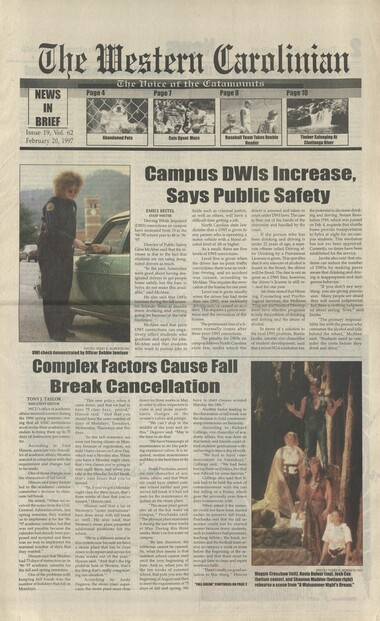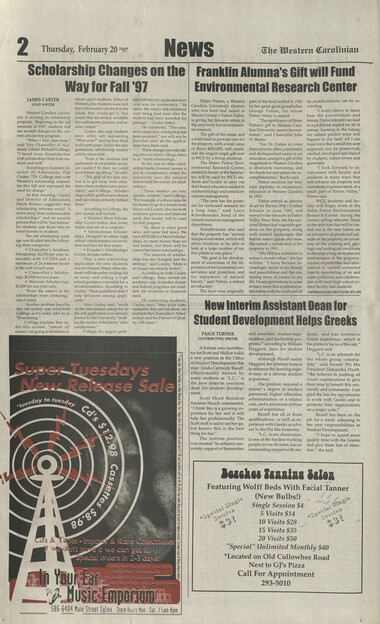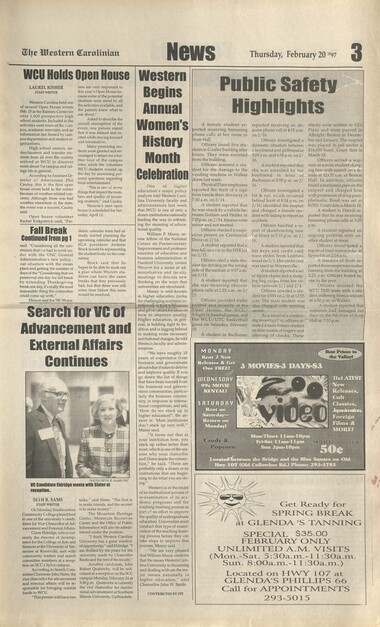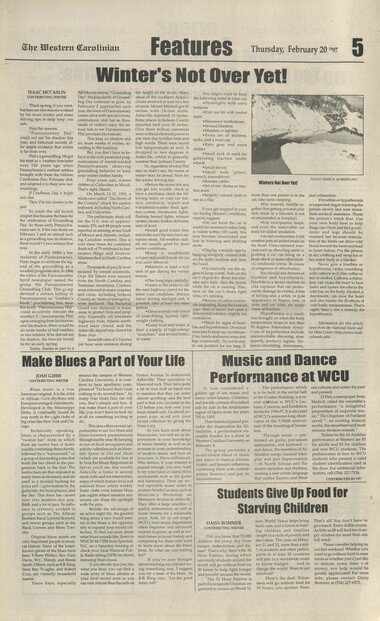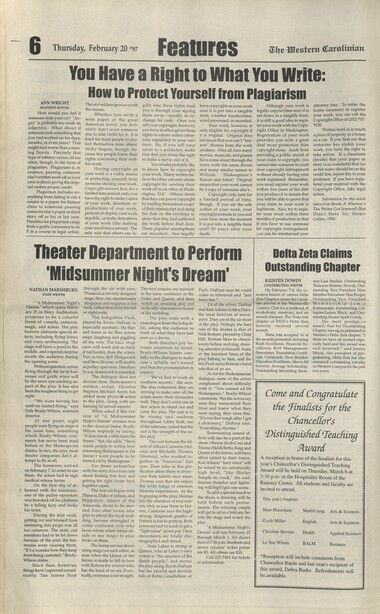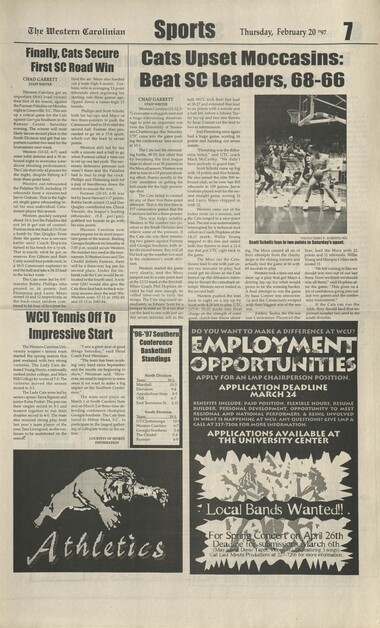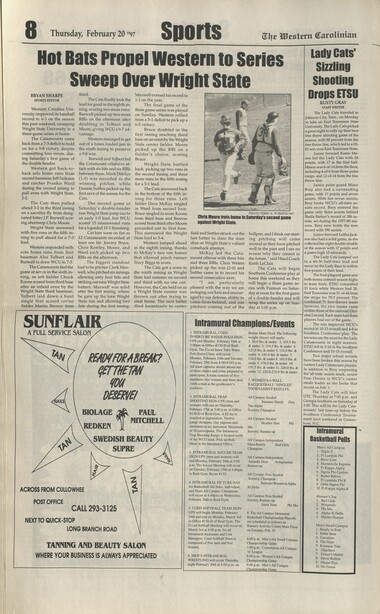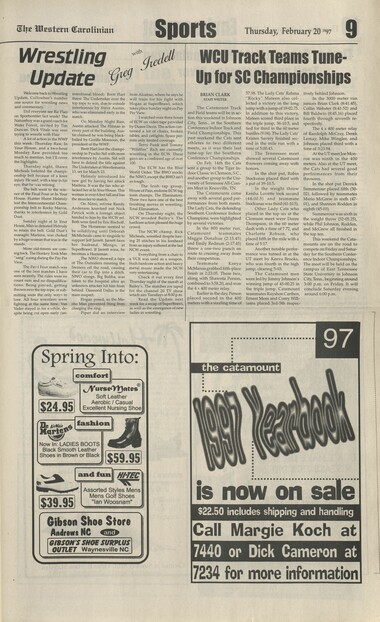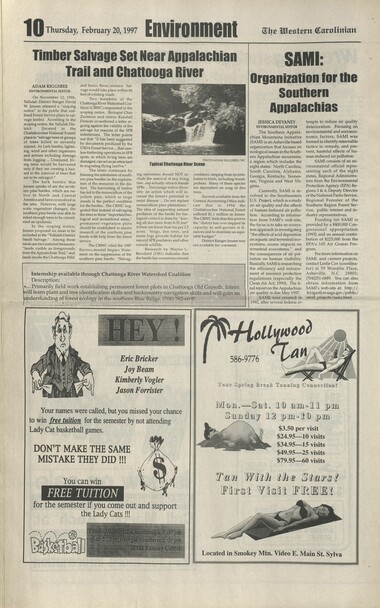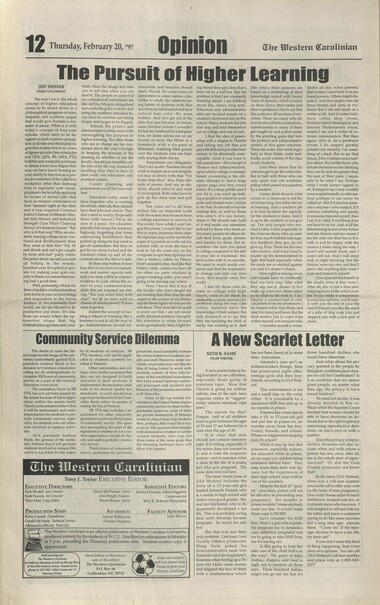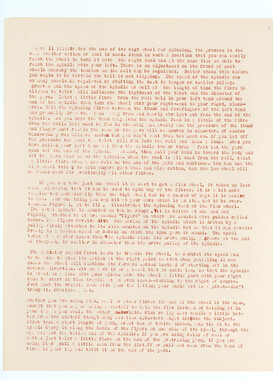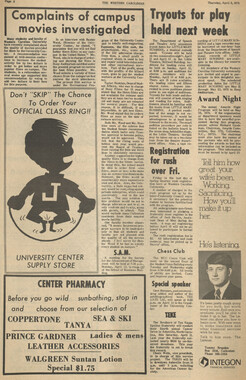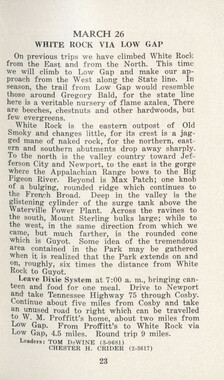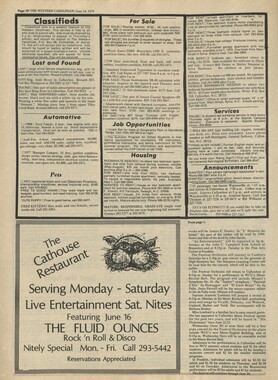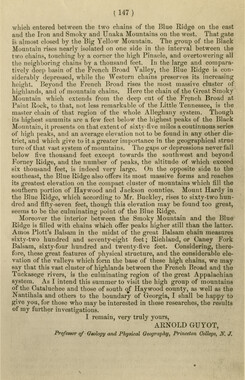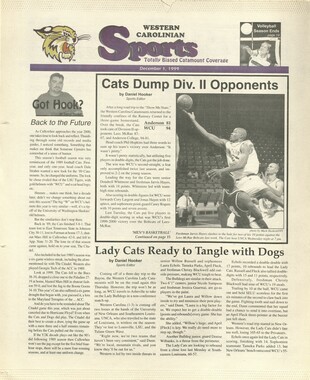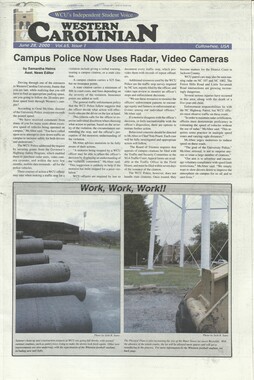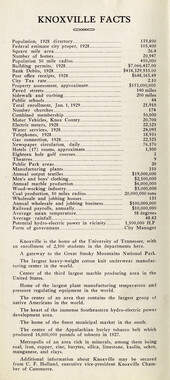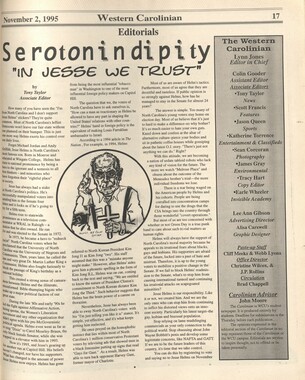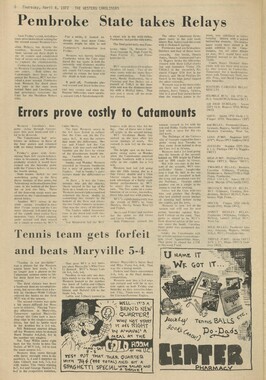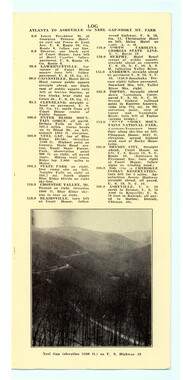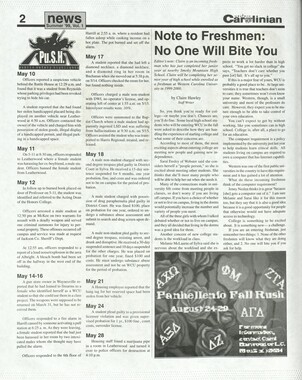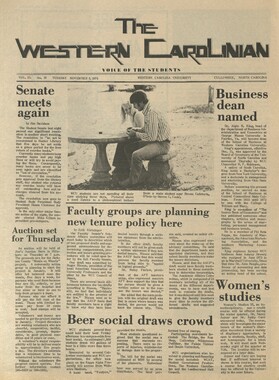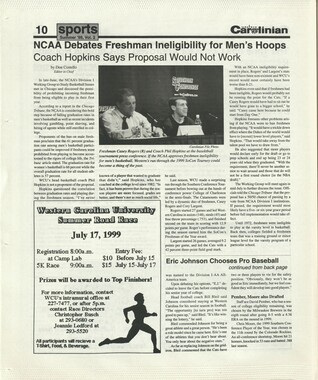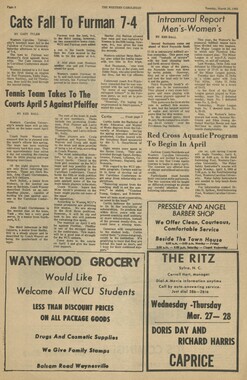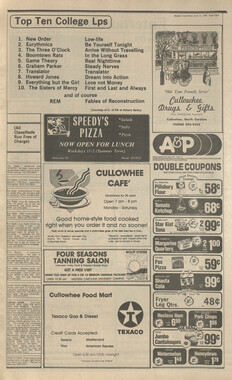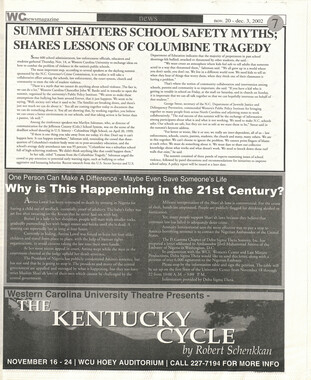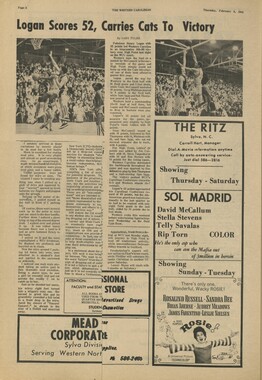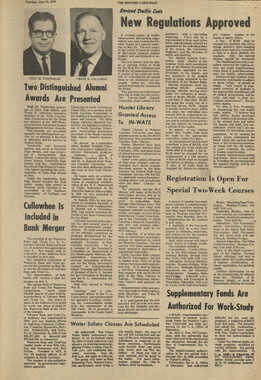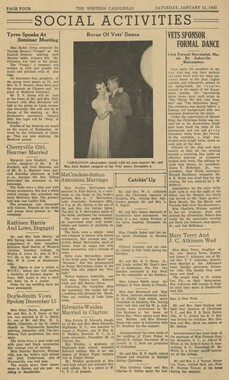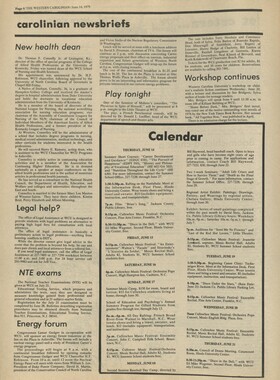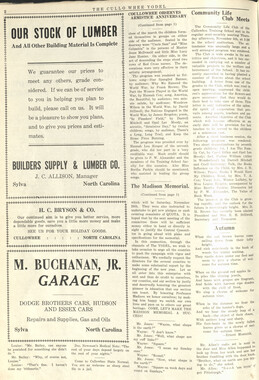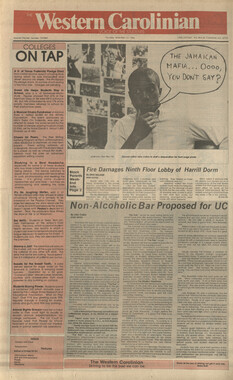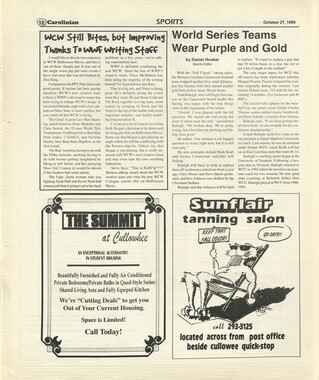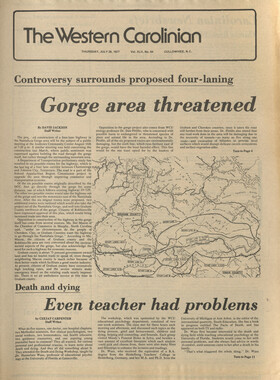Western Carolina University (20)
View all
- Canton Champion Fibre Company (2308)
- Cherokee Traditions (293)
- Civil War in Southern Appalachia (165)
- Craft Revival (1942)
- Great Smoky Mountains - A Park for America (2767)
- Highlights from Western Carolina University (430)
- Horace Kephart (941)
- Journeys Through Jackson (154)
- LGBTQIA+ Archive of Jackson County (19)
- Oral Histories of Western North Carolina (314)
- Picturing Appalachia (6679)
- Stories of Mountain Folk (413)
- Travel Western North Carolina (160)
- Western Carolina University Fine Art Museum Vitreograph Collection (129)
- Western Carolina University Herbarium (92)
- Western Carolina University: Making Memories (708)
- Western Carolina University Publications (2283)
- Western Carolina University Restricted Electronic Theses and Dissertations (146)
- Western North Carolina Regional Maps (71)
- World War II in Southern Appalachia (131)
University of North Carolina Asheville (6)
View all
- Allanstand Cottage Industries (62)
- Appalachian National Park Association (53)
- Bennett, Kelly, 1890-1974 (1295)
- Berry, Walter (76)
- Brasstown Carvers (40)
- Carver, George Washington, 1864?-1943 (26)
- Cathey, Joseph, 1803-1874 (1)
- Champion Fibre Company (233)
- Champion Paper and Fibre Company (297)
- Cherokee Indian Fair Association (16)
- Cherokee Language Program (22)
- Crowe, Amanda (40)
- Edmonston, Thomas Benton, 1842-1907 (7)
- Ensley, A. L. (Abraham Lincoln), 1865-1948 (275)
- Fromer, Irving Rhodes, 1913-1994 (70)
- George Butz (BFS 1907) (46)
- Goodrich, Frances Louisa (120)
- Grant, George Alexander, 1891-1964 (96)
- Heard, Marian Gladys (60)
- Kephart, Calvin, 1883-1969 (15)
- Kephart, Horace, 1862-1931 (313)
- Kephart, Laura, 1862-1954 (39)
- Laney, Gideon Thomas, 1889-1976 (439)
- Masa, George, 1881-1933 (61)
- McElhinney, William Julian, 1896-1953 (44)
- Niggli, Josephina, 1910-1983 (10)
- North Carolina Park Commission (105)
- Osborne, Kezia Stradley (9)
- Owens, Samuel Robert, 1918-1995 (11)
- Penland Weavers and Potters (36)
- Roberts, Vivienne (15)
- Roth, Albert, 1890-1974 (142)
- Schenck, Carl Alwin, 1868-1955 (1)
- Sherrill's Photography Studio (2565)
- Southern Highland Handicraft Guild (127)
- Southern Highlanders, Inc. (71)
- Stalcup, Jesse Bryson (46)
- Stearns, I. K. (213)
- Thompson, James Edward, 1880-1976 (226)
- United States. Indian Arts and Crafts Board (130)
- USFS (683)
- Vance, Zebulon Baird, 1830-1894 (1)
- Weaver, Zebulon, 1872-1948 (58)
- Western Carolina College (230)
- Western Carolina Teachers College (282)
- Western Carolina University (1794)
- Western Carolina University. Mountain Heritage Center (18)
- Whitman, Walt, 1819-1892 (10)
- Wilburn, Hiram Coleman, 1880-1967 (73)
- Williams, Isadora (3)
- Cain, Doreyl Ammons (0)
- Crittenden, Lorraine (0)
- Rhodes, Judy (0)
- Smith, Edward Clark (0)
- Appalachian Region, Southern (2393)
- Asheville (N.C.) (1886)
- Avery County (N.C.) (26)
- Blount County (Tenn.) (161)
- Buncombe County (N.C.) (1664)
- Cherokee County (N.C.) (283)
- Clay County (N.C.) (555)
- Graham County (N.C.) (233)
- Great Smoky Mountains National Park (N.C. and Tenn.) (478)
- Haywood County (N.C.) (3522)
- Henderson County (N.C.) (70)
- Jackson County (N.C.) (4692)
- Knox County (Tenn.) (25)
- Knoxville (Tenn.) (12)
- Lake Santeetlah (N.C.) (10)
- Macon County (N.C.) (420)
- Madison County (N.C.) (211)
- McDowell County (N.C.) (39)
- Mitchell County (N.C.) (132)
- Polk County (N.C.) (35)
- Qualla Boundary (981)
- Rutherford County (N.C.) (76)
- Swain County (N.C.) (2020)
- Transylvania County (N.C.) (247)
- Watauga County (N.C.) (12)
- Waynesville (N.C.) (68)
- Yancey County (N.C.) (72)
- Aerial Photographs (3)
- Aerial Views (60)
- Albums (books) (4)
- Articles (1)
- Artifacts (object Genre) (228)
- Biography (general Genre) (2)
- Cards (information Artifacts) (38)
- Clippings (information Artifacts) (191)
- Crafts (art Genres) (622)
- Depictions (visual Works) (21)
- Design Drawings (1)
- Drawings (visual Works) (184)
- Envelopes (73)
- Facsimiles (reproductions) (1)
- Fiction (general Genre) (4)
- Financial Records (12)
- Fliers (printed Matter) (67)
- Glass Plate Negatives (381)
- Guidebooks (2)
- Internegatives (10)
- Interviews (811)
- Land Surveys (102)
- Letters (correspondence) (1013)
- Manuscripts (documents) (619)
- Maps (documents) (159)
- Memorandums (25)
- Minutes (administrative Records) (59)
- Negatives (photographs) (5735)
- Newsletters (1285)
- Newspapers (2)
- Occupation Currency (1)
- Paintings (visual Works) (1)
- Pen And Ink Drawings (1)
- Periodicals (193)
- Personal Narratives (7)
- Photographs (12982)
- Plans (maps) (1)
- Poetry (5)
- Portraits (1657)
- Postcards (329)
- Programs (documents) (151)
- Publications (documents) (2237)
- Questionnaires (65)
- Scrapbooks (282)
- Sheet Music (1)
- Slides (photographs) (402)
- Sound Recordings (796)
- Specimens (92)
- Speeches (documents) (15)
- Tintypes (photographs) (8)
- Transcripts (322)
- Video Recordings (physical Artifacts) (23)
- Vitreographs (129)
- Text Messages (0)
- A.L. Ensley Collection (275)
- Appalachian Industrial School Records (7)
- Appalachian National Park Association Records (336)
- Axley-Meroney Collection (2)
- Bayard Wootten Photograph Collection (20)
- Bethel Rural Community Organization Collection (7)
- Blumer Collection (5)
- C.W. Slagle Collection (20)
- Canton Area Historical Museum (2110)
- Carlos C. Campbell Collection (282)
- Cataloochee History Project (65)
- Cherokee Studies Collection (4)
- Daisy Dame Photograph Album (5)
- Daniel Boone VI Collection (1)
- Doris Ulmann Photograph Collection (112)
- Elizabeth H. Lasley Collection (1)
- Elizabeth Woolworth Szold Fleharty Collection (4)
- Frank Fry Collection (95)
- George Masa Collection (173)
- Gideon Laney Collection (452)
- Hazel Scarborough Collection (2)
- Hiram C. Wilburn Papers (28)
- Historic Photographs Collection (236)
- Horace Kephart Collection (861)
- Humbard Collection (33)
- Hunter and Weaver Families Collection (1)
- I. D. Blumenthal Collection (4)
- Isadora Williams Collection (4)
- Jesse Bryson Stalcup Collection (47)
- Jim Thompson Collection (224)
- John B. Battle Collection (7)
- John C. Campbell Folk School Records (80)
- John Parris Collection (6)
- Judaculla Rock project (2)
- Kelly Bennett Collection (1314)
- Love Family Papers (11)
- Major Wiley Parris Civil War Letters (3)
- Map Collection (12)
- McFee-Misemer Civil War Letters (34)
- Mountain Heritage Center Collection (4)
- Norburn - Robertson - Thomson Families Collection (44)
- Pauline Hood Collection (7)
- Pre-Guild Collection (2)
- Qualla Arts and Crafts Mutual Collection (12)
- R.A. Romanes Collection (681)
- Rosser H. Taylor Collection (1)
- Samuel Robert Owens Collection (94)
- Sara Madison Collection (144)
- Sherrill Studio Photo Collection (2558)
- Smoky Mountains Hiking Club Collection (616)
- Stories of Mountain Folk - Radio Programs (374)
- The Reporter, Western Carolina University (510)
- Venoy and Elizabeth Reed Collection (16)
- WCU Gender and Sexuality Oral History Project (32)
- WCU Mountain Heritage Center Oral Histories (25)
- WCU Oral History Collection - Mountain People, Mountain Lives (71)
- WCU Students Newspapers Collection (1744)
- Western North Carolina Tomorrow Black Oral History Project (69)
- William Williams Stringfield Collection (2)
- Zebulon Weaver Collection (109)
- African Americans (388)
- Appalachian Trail (35)
- Artisans (521)
- Cherokee art (84)
- Cherokee artists -- North Carolina (10)
- Cherokee language (21)
- Cherokee pottery (101)
- Cherokee women (208)
- Church buildings (166)
- Civilian Conservation Corps (U.S.) (110)
- College student newspapers and periodicals (1830)
- Dams (95)
- Dance (1023)
- Education (222)
- Floods (60)
- Folk music (1015)
- Forced removal, 1813-1903 (2)
- Forest conservation (220)
- Forests and forestry (917)
- Gender nonconformity (4)
- Great Smoky Mountains National Park (N.C. and Tenn.) (154)
- Hunting (38)
- Landscape photography (10)
- Logging (103)
- Maps (84)
- Mines and mineral resources (8)
- North Carolina -- Maps (18)
- Paper industry (38)
- Postcards (255)
- Pottery (135)
- Railroad trains (69)
- Rural electrification -- North Carolina, Western (3)
- School integration -- Southern States (2)
- Segregation -- North Carolina, Western (5)
- Slavery (5)
- Sports (452)
- Storytelling (245)
- Waterfalls -- Great Smoky Mountains (N.C. and Tenn.) (66)
- Weaving -- Appalachian Region, Southern (280)
- Wood-carving -- Appalachian Region, Southern (328)
- World War, 1939-1945 (173)
Western Carolinian Volume 62 Number 19
Item
Item’s are ‘child’ level descriptions to ‘parent’ objects, (e.g. one page of a whole book).
-
-
®k tetern foolmtan NEWS oThje Jtaizz nf th£ (EatamntttttBt Page 4 Page 7 Page 8 Page10 BRIEF Issue 19, Vol. 62 February 20, 1997 Abandoned Pets Baseball Team Takes Double Header __ Campus DWIs Increase Says Public Safety PHOTO TERRY K. ROBERTS/WC DWI check demonstrated by Officer Debbie Jamison EMILY BEITEL STAFF WRITER Driving While Impaired (DWI) convictions on campus have increased from 19 in the '94-'95 school year to 48 in '96- '97. Director of Public Safety Gene McAbee said that the increase is due to the fact that students are not using designated drivers as much. "In the past, fraternities were good about having designated drivers to get people home safely, but the bars in Sylva do not make this available," said McAbee. He also said that DWIs increase during the fall semester because there is usually more drinking and driving going on because of the new freshmen. McAbee said that prior DWI convictions can negatively affect students who graduate and apply for jobs. McAbee said that students who want to pursue jobs in fields such as criminal justice, as well as others, will have a difficult time getting a job. North Carolina state law dictates that a DWI is given to any person who is operating a motor vehicle with a blood alcohol level of .08 or higher. As a result, there are five levels of DWI convictions. Level five is given when the driver has no prior traffic convictions, there was no reckless driving, and no accident was caused, according to McAbee. This requires the revocation of the license for one year. Level one is given usually when the driver has had more than one DWI, was recklessly driving and/or caused an accident. This requires a prison sentence and the revocation of the license. The permanent loss of a license normally comes after three prior DWI convictions. The penalty for DWIs on campus follows North Carolina state law, under which the driver is arrested and taken to court under DWI laws. The case is then out of the hands of the university and handled by the court. If the person who has been drinking and driving is under 21 years of age, a separate offense called Driving after Drinking by a Provisional Licensee is given. This specifies that if any amount of alcohol is found in the blood, the driver will be fined. The fine is not as great as a DWI fine; however, the driver's license is still revoked for one year. McAbee stated that Housing, Counseling and Psychological Services, the Wellness Program and Student Development have effective programs to help the problem of drinking and driving and the abuse of alcohol. In terms of a solution to the local DWI problem, Bonita Jacobs, interim vice chancellor of student development, said that a recent SGA resolution has the potential to decrease drinking and driving. Senate Resolution 1769, which was passed on Feb. 4, requests that shuttle buses provide transportation to Sylva at night for on-cam- pus students. This resolution has not yet been approved. Currently, no times have been established for the service. Jacobs also said that students can reduce the number of DWIs by making peers aware that drinking and driving is inappropriate and dangerous behavior. "If you don't say anything, you are giving permission. Many people are afraid they will sound judgmental, but there is nothing judgmental about saving lives," said Jacobs. "The primary responsibility lies with the person who consumes the alcohol and falls behind the wheel," McAbee said. "Students need to consider the costs before they drink and drive." Complex Factors Cause Fall Break Cancellation TONY J. TAYLOR EXECUTIVE EDITOR WCU's office of academic affairs received a notice during the 1996 spring semester stating that all UNC institutions must revise their academic calendars to bring them up to 75 days of instruction per semester. According to Fred Hinson, associate vice chancellor of academic affairs, Western was not in compliance with the requirement and changes had to be made. One of those changes was the elimination of fall break. Hinson said many factors led to the academic calendar committee's decision to eliminate fall break. He stated, "When we received the notice from the UNC General Administration, last spring semester, they wanted us to implement it for the '96- '97 academic calendar, but that was not possible because the calendar had already been proposed and accepted and there was no way to implement the minimal number of days that they wanted." Hinson said that Western had 73 days of instruction on its '96-'97 academic calendar for the fall and spring semesters. One of the problems with keeping fall break was the number of holidays that fell on Mondays. "This new policy, when it came down, said that we had to have 75 class days, period," Hinson said. "And that you should have the same number of days of Mondays, Tuesdays, Wednesday, Thursdays and Fridays. "In the fall semester, we were not having classes on Monday because of registration, we didn't have classes on Labor Day, which was a Monday also. When you have a Monday night class, that's two classes you're going to miss right there, and when you take in the Monday for fall break, that's nine hours that you've missed. "So, if you've got a Monday night class for three hours, that's three weeks of class that you've missed," Hinson said. Hinson said that a lot of Western's "sister institutions" have done away with fall break as well. He also said that Western's steam plant presented additional problems for the school. "We're a different animal in this system now because we have a steam plant that has to close down to do repairs and service for three weeks out of the year," Hinson said. "And that's the big problem here at Western, that's the thing that's really complicating our situation." According to Andy Degrove, the steam plant supervisor, the steam plant must close down for three weeks in May in order to allow inspectors to come in and make maintenance changes on the system's valves and pumps. "We can't stop in the middle of the year and do this," Degrove'said. "May is the time to do that. "We have beaucoups of maintenance to do like packing expensive valves. It is required, routine maintenance and May is the best time to do it." Frank Prochaska, associate vice chancellor of academic affairs, said that Western could have started summer school earlier and preserved fall break if it had not been for the maintenance required on the steam plant. "The steam plant generates all of the hot water on campus," Prochaska said. "The physical plant maintains it during the last three weeks of May. During this three weeks, there's no hot water on campus. "By law, therefore, the cafeterias cannot be opened. So, what that means is that summer school cannot start until the very beginning of June. And so, when you do the ten weeks of summer school, that puts you into the beginning of August and then to meet the requirements of 75 days of fall and spring. We have to start classes around Monday the 18th." Another factor leading to the elimination of fall break was the decision to hold commencement ceremonies on Saturday. According to Richard Collings, vice chancellor of academic affairs, this was done so that family and friends could attend students' graduations without having to miss a day of work. "We had to have commencement on Saturdays," Collings said. "We had been having them on Fridays, but that was difficult for some families." Collings also said that finals had to be held the week of commencement with the last day falling on a Friday, which gave the university even fewer days to maneuver with. When asked if the semester could not have been started earlier to preserve fall break, Prochaska said that the fall semester could not be started sooner because many students, such as residence hall personnel, teaching fellow:-, the band, sororities and the football team arrive on campus a week or more before the beginning of the semester and that there must be enough time to clean and repair residence halls. "There's really no good solution to this thing," Hinson TALL BREAK" CONTINUED ON PAGE 2 PHOTO TERRY K. ROBERTS/WC Maggie Crenshaw (left), Kevin Dufour (top), Josh Cox (bottom center), and Shannon Madden (bottom right) rehearse a scene from "A Midsummer Night's Dream"
Object
Object’s are ‘parent’ level descriptions to ‘children’ items, (e.g. a book with pages).
-
The Western Carolinian is Western Carolina University's student-run newspaper. The paper was published as the Cullowhee Yodel from 1924 to 1931 before changing its name to The Western Carolinian in 1933.
-
